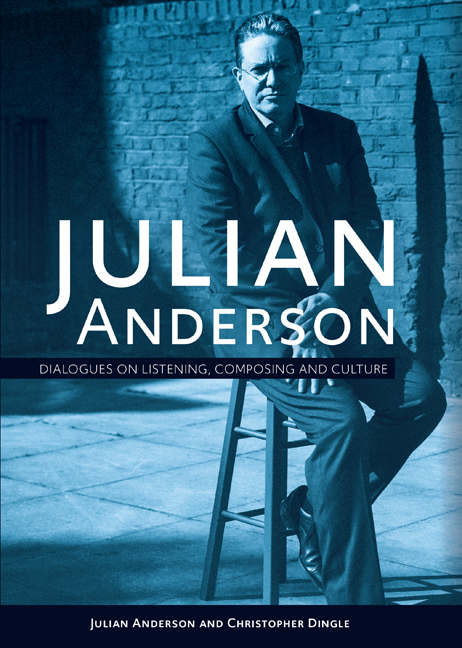Book contents
- Frontmatter
- Contents
- List of Illustrations
- Foreword
- Acknowledgements
- Introduction
- Prelude – Jeux: A Conversation Over Lunch
- Conversation One Origins
- Conversation Two Enthusiasms
- Conversation Three Training
- Conversation Four Dance
- Conversation Five Folk
- Conversation Six Composing (or Not)
- Conversation Seven Understandings
- Conversation Eight Beginnings (and Endings)
- Conversation Nine Puzzles
- Conversation Ten Singing
- Conversation Eleven Olly
- Conversation Twelve Memory
- Conversation Thirteen Opera
- Conversation Fourteen Practices
- Conversation Fifteen Outsiders?
- Conversation Sixteen Quartets
- Conversation Seventeen Advocacy
- Conversation Eighteen Partnerships
- Coda: Multiple Choices
- Chronology
- List of Personae
- Glossary of Musical Terms
- Macrotonality
- Catalogue of Published Works by Julian Anderson
- List of Recordings of Julian Anderson’s Music
- Bibliography
- Discography
- Index
Coda: Multiple Choices
Published online by Cambridge University Press: 16 September 2020
- Frontmatter
- Contents
- List of Illustrations
- Foreword
- Acknowledgements
- Introduction
- Prelude – Jeux: A Conversation Over Lunch
- Conversation One Origins
- Conversation Two Enthusiasms
- Conversation Three Training
- Conversation Four Dance
- Conversation Five Folk
- Conversation Six Composing (or Not)
- Conversation Seven Understandings
- Conversation Eight Beginnings (and Endings)
- Conversation Nine Puzzles
- Conversation Ten Singing
- Conversation Eleven Olly
- Conversation Twelve Memory
- Conversation Thirteen Opera
- Conversation Fourteen Practices
- Conversation Fifteen Outsiders?
- Conversation Sixteen Quartets
- Conversation Seventeen Advocacy
- Conversation Eighteen Partnerships
- Coda: Multiple Choices
- Chronology
- List of Personae
- Glossary of Musical Terms
- Macrotonality
- Catalogue of Published Works by Julian Anderson
- List of Recordings of Julian Anderson’s Music
- Bibliography
- Discography
- Index
Summary
CD: Looking at your catalogue, at times you seem to have had multiple projects at once.
JA: Not now, but from 1988 to 1994, yes, there were. Now I write one piece at a time, but it's normal to think about other things to come.
CD: Harmony clearly came in the middle of the opera and things like that.
JA: Yes, but it was based upon music from the opera. Funnily enough, just now, I have two very different pieces on the go, though I’m only focusing on one of them. There's a guitar piece [Catalan Peasant with Guitar] and a new ensemble piece [Van Gogh Blue]. The guitar piece is the one I’m concentrating on. Writing for the guitar is hard: the fingering is such a nightmare. I’ve had to learn the guitar in order to compose it. I’m enjoying it, but it's very difficult.
JA: Yes, and I keep mis-numbering them! So sometimes I work on the ensemble piece to get a break from that problem, but I’ll only work intensively on the ensemble piece once the guitar piece is finished. So it's still just one piece at a time really, and I’ve worked that way since 1994. But of course my mind is constantly thinking ahead, bouncing ideas about for other things. That's a remnant of the period from 1988 to 1994 when I had six pieces on the go at once. I never do that now. CD: Six strings to get wrong?
CD: While you’re working on a piece, some of that is relatively simple, just getting notes down on a page. You say there are ideas bouncing around your head. Is your mind conceiving other things while doing some of the more mechanical bits of writing?
JA: Oh, sure. The mechanical part is the copying – usually. I say that because, as already explained, in some cases major new ideas have cropped up at the fair-copying stage – as in The Crazed Moon and elsewhere. So even at the fair-copy stage, occasionally, fresh things can suddenly crop up.
CD: But, otherwise, the copying is mechanical so your mind is free?
- Type
- Chapter
- Information
- Julian AndersonDialogues on Listening, Composing and Culture, pp. 379 - 381Publisher: Boydell & BrewerPrint publication year: 2020



